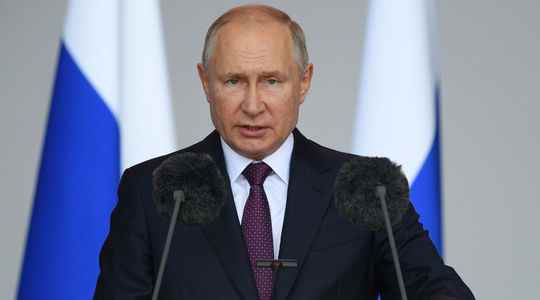What still seemed hard to believe a few days ago has finally happened: Vladimir Putin declared war on Ukraine on Thursday, February 24. For several hours, the Russian army leads a “full-scale invasion” against its neighbour, and we already condemn, in the United States and in Europe, this unprecedented aggression, while preparing a new salvo of sanctions…
In addition to the measures already taken against Russian leaders and organizations, Washington, Brussels and London could, as they had announced, “go much further” by using what some call a “financial atomic bomb”, that is- ie take the country out of Swift, the international interbank messaging system. “It must be done immediately,” Ukrainian Foreign Minister Dmytro Kouleba said on Twitter, supported by other leaders. But would this decision be that effective? Not so sure…
- You don’t get out of Swift in a snap of your fingers
Swift is a private organization based in Brussels. Since 1973, it has enabled its approximately 10,000 members present in just over 200 countries to send each other information on financial transactions. Any member of Swift can of course be excluded – even all members of a country, but to do so would require a majority decision of the organization’s 25 directors. But this procedure, if it can be accelerated because of the urgency of the situation, will take at least a few days. In 2012, Swift, after sanctions imposed by Washington and Brussels, voted to exclude Iranian financial institutions.
Beyond the deadline until an exclusion is decided and the fact that Putin would have time to move forward in the meantime, some European countries could especially be reluctant to the idea of such a procedure, which would have significant economic consequences for their businesses. “Russia is an important trading partner for many European countries such as Italy,” explains Sylvie Matelly, deputy director of the Institute for International and Strategic Relations (IRIS). According to Reuters, the EU is not yet in favor of Russia’s withdrawal from SWIFT.
- Alternatives exist
Swift is a system that facilitates international payments. But, detail which is important, it does not authorize them. Even after its possible exclusion, Russia will therefore still be able to carry out international transactions. First, by fax and e-mail, to continue to communicate with non-American and European banks. “China will obviously continue to work with Russia, and it will not be the only one,” said a banker.
Since the first sanctions in 2014 when taking Crimea, the Kremlin boss has also started to develop his own system, called SPFS (for “financial message transfer system”). Available since 2017, this “Russian Swift”, which China is making compatible with its own system, has not been very successful: only a few dozen foreign banks based in Armenia, Belarus, Kazakhstan or Kyrgyzstan have so far adopted it.
- Russia has gigantic financial reserves
Beyond payment systems, Putin has also built up a large cushion of reserves, in foreign currencies and gold, precisely to hold up in the event of tensions and cuts in access to the global financial system. In total, the Russian Central Bank would have 800 billion dollars (716 billion euros) in reserve.
How long could Putin last with this sum? It all depends on the country’s trade balance. Over the last three months of 2021, Russia posted a record trade surplus of $67.6 billion. With trade sanctions, these could of course go down. But a large part of the balance comes from gas and oil exports to Europe, which cannot completely do without it…
